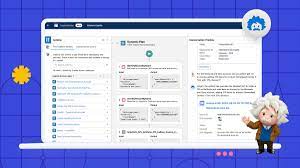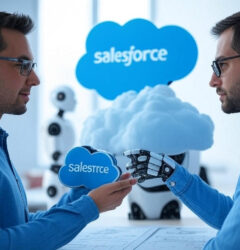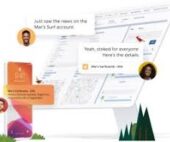What Does the New Einstein 1 Data Cloud Mean for Your Organization? Einstein 1 is Coming
One of the major announcements at Dreamforce was the exciting intro that Einstein 1 is Coming. The Einstein 1 Data Cloud is now natively integrated with the Einstein 1 Platform. This integration allows users to connect any data, create unified customer profiles, and enhance every customer experience with AI, automation, and analytics. This is a giant step for Salesforce-kind. It can revolutionize the ways businesses engage with their customers.
While this announcement is exciting, what does it mean for organizations at different stages of their Salesforce journey? In this insight, we explore the announcement details, considerations for using the Einstein 1 Data Cloud in your company, and how Tectonic can assist in navigating this new offering.
What’s New with the Platform?
The integration of Salesforce Data Cloud and Einstein AI into the Einstein 1 Platform marks a significant enhancement. The platform integration enables companies to securely connect any data, build AI-powered apps with low code, and deliver superior CRM experiences. It unifies data across the enterprise by mapping it to Salesforce’s underlying metadata framework, regardless of how the data is structured in disparate systems. Regardless of how complex it is.
What is Einstein 1 Data Cloud? The Key to Unified Data
Salesforce Einstein 1 Data Cloud unifies customer data, enterprise content, telemetry data, Slack conversations, and other structured and unstructured data to create a single view of the customer. This integration unlocks otherwise siloed data and scales operations in new ways:
- Data: The platform supports thousands of metadata-enabled objects per customer, each capable of holding trillions of rows. Marketing Cloud and Commerce Cloud are now re-engineered to integrate into the Einstein 1 Platform.
- Automation: Massive data volumes can be imported into the platform from other systems and immediately utilized as actionable Salesforce objects. Automated workflows can be triggered by changes to any object, interfacing with enterprise systems via MuleSoft.
- Analytics: A common metadata schema and access model enable comprehensive insights and analytics through tools like Reports and Dashboards, Tableau, CRM Analytics, and Marketing Cloud Reports, all working on the same data at scale.
Salesforce has announced that Enterprise Edition and above customers can use Data Cloud at no additional cost. However, organizations should consider their position on the Salesforce maturity curve before implementation. Data Cloud’s capabilities, while extensive, might not fully optimize data for organizations further along in their Salesforce journey without a thorough trial.
What is the Einstein Conversational Assistant? An AI-Powered Shift
Einstein now includes a generative AI-powered conversational assistant featuring Einstein Copilot and Einstein Copilot Studio. These tools operate within the Einstein Trust Layer, a secure AI architecture native to the Einstein 1 Platform that ensures data privacy and security.
- Einstein Copilot: An out-of-the-box AI assistant built into every Salesforce application, enhancing productivity by allowing users to ask questions in natural language and receive secure, relevant answers grounded in proprietary company data from Data Cloud.
- Einstein Copilot Studio: Enables companies to create AI-powered apps with custom prompts, skills, and models. This tool can be used to automatically generate websites based on personalized browsing history or convert natural language prompts into code.
Why Should Organizations Consider Einstein 1?
Customer data is often fragmented and siloed across disparate systems, preventing a unified view necessary for informed business decision-making. Data unification is essential for data-driven decision making and fully getting the full ROI of AI.
AI is a major trend in technology, but effective AI requires comprehensive, aligned data. Without a unified data foundation, AI’s potential is limited. Einstein 1 with Data Cloud provides the solution by consolidating data, enabling the training of AI models to make optimal decisions and recommendations.
How Can Tectonic Help You Transition?
Tectonic brings extensive Salesforce expertise and industry-specific experience in sectors heavily reliant on data, such as healthcare, financial services, and travel and tourism. These industries face strict data regulations and often have siloed data in legacy systems.
Einstein 1 helps organizations achieve a 360-degree view of their customers by unifying data. Tectonic can assist in maximizing AI on the Salesforce platform by building a robust data foundation and providing a roadmap for future scalability.
While both Einstein 1 and AI Cloud are Salesforce terms that promise AI-driven capabilities, there are differences to consider. Einstein 1 Platform is a comprehensive suite that includes Data Cloud, AI tools, and automation capabilities. In contrast, AI Cloud is more of an overarching term that might encompass Einstein 1 as part of its suite, focusing on the broader application of AI across Salesforce’s entire range of products and services. Understanding these distinctions is critical in identifying which solution aligns with your organizational needs.













